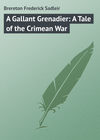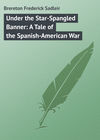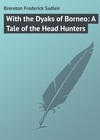Buch lesen: «A Gallant Grenadier: A Tale of the Crimean War», Seite 19
Long ere this Phil had learnt that polite words are not usually wasted on Russian privates, and he determined to take advantage of the fact.
“Idiot!” he answered roughly. “Cannot you see that I am your officer, and can I not give instructions to my lieutenant without your challenging?”
“My orders are to challenge everyone,” the sentry answered humbly. “Excellency, give the countersign and I shall know you better. Some dogs of prisoners have recently escaped, for I heard the bell, therefore I must be cautious.”
“My word, we’re done again!” groaned Phil. Then taking the bull by the horns, he advanced a pace and said roughly, “How can I remember the word every night after all these weeks? Wait, though – ah, was not the first letter ‘N’?”
“That is right, excellency; and our master the Czar’s name also commences with that letter,” the sentry replied encouragingly.
“Nicolas!” cried Phil boldly.
“Excellency, your pardon on my insisting; pass whither you will. All is well.”
“That is good, fellow,” Phil cried. “Come, comrades, we have business with the Malakoff.”
Another fire minutes, and the sentry and trench were passed. Skirting by the great fortress, they bore up for the British trenches, crossing as they did so several rows of ditches and earthworks. Then they lay down and listened. Close at hand there was a hum of voices, while away on the left a sharp musketry fire was being maintained, the flicker of the exploding powder cutting the darkness at every second. In front all was pitch blackness in the valley in which they stood, but higher up on the elopes beyond fires were burning, and dark figures were occasionally silhouetted against them as they passed.
“Now for it!” whispered Phil. “If there is any firing lie on your faces. We don’t want to be killed by our own side.”
Sneaking through the mud and mire on hands and knees the three crept forward in absolute silence. Soon the last trench was passed, and the British earthworks loomed in the distance. At last they were close to liberty and friends. Not more than sixty yards separated them, and already the murmur of the men’s voices could be heard, when, with a sharp exclamation, Phil disappeared.
There was a scuffle, a startled cry of astonishment and fear, and the loud report of a musket.
“Quick, help me!” Phil cried from the rifle-pit into which he had fallen. Then there was a choked cry, and all was silence for a few moments.
With a growl of rage Tony threw himself into the pit, almost smashing Phil as he fell.
“That you, Tony?” the latter asked coolly.
“Yes, it’s me sure enough, mate. Are yer hurt, old man?”
“Not a bit, but it was a hard struggle. I fancy the Russian is dead, for I gave him a tremendous blow on the head with my iron bar. Now, let us push on, for the alarm has been given, and it will mean capture if we stay.”
But the Russian sharpshooters had taken the alarm. Occupying a row of pits, each of which was sufficiently large to hold one man, they had orders to worry the besiegers by their fire, and to be always on the look-out for an assault. At the report of their comrade’s weapon they imagined that they were about to be attacked, and poured volley after volley at the British earthworks. Instantly the sharp crackle of Minié rifles broke out, and Phil and his friends found themselves in the awkward position of receiving fire from their friends.
“Down in here for your lives,” cried Phil; and within half a minute they were wedged in the pit, while a perfect hail of bullets swept overhead. Both sides imagined that a sortie was taking place, and the alarm spreading, the guns on either side opened fire, and a perfect torrent of shell hummed in the air and burst with deafening crashes in the darkness. A loud scuffling was then heard in the British trenches, there was a sharp order, and a host of dark figures sprang over the earthworks and dashed at the Russians.
Phil and his friends lay flat upon their faces, while the Russians in the other pits for the most part fled for their lives. Those who did not were bayoneted.
“Hallo, come out of it, you skulkers!” a voice cried; and, looking up, Phil caught sight of the figures of English soldiers at the mouth of the pit.
“Don’t fire,” he shouted, “we are friends. We are escaping prisoners.”
“Now, then, none of yer sauce,” the same voice answered wrathfully. “Most like you’re deserters. Out yer come and let’s take a look at yer.”
In a trice they were dragged ignominiously from the pit.
“Why, what’s this?” the sergeant, who had charge of the party, exclaimed. “The light’s bad, but blow me if there ain’t two British officers here. Get round ’em, boys, and bring ’em along.”
With a rush the group of soldiers returned, bearing Phil and his friends with them.
“Now, send along that lamp,” cried the sergeant, as soon as they were safely sheltered by the earthworks. “Blow me, but I’m right. They’re Britishers or I’m a wrong ’un,” he cried, lifting the lantern to their faces. “Hi, pass the word to Mr Ellis there.”
A moment later an officer came hurrying along.
“What is all this commotion about?” he asked sharply. “The whole camp is disturbed, and you seem to have made a sortie, Sergeant.”
“Quite right, sir! There was a bit of a ruction over in them rifle-pits, and as I knew you was anxious to teach them Russians a lesson, and the boys was mad to get at ’em, why, we did a rush and cleared ’em out like rats. We found these three there. They said they were escaping prisoners, so we brought ’em along.”
“Who are you, then?” asked the officer, examining them by the aid of his lantern.
“Why, bless my life if it isn’t Western, reported drowned at sea!” he exclaimed with a start. “You’re like a jack-in-the-box, Western. Who are your friends?”
Phil mentioned their names.
“We had a near squeak for it,” he said faintly. “By the way, Ellis, is there a doctor near? McNeil is in need of dressing, and I fear I have got a bullet in my ribs.”
That was the case. At the first outburst of firing, a bullet had struck him in the side like a sledge-hammer, but Phil kept his groans to himself. Now, however, when all need for further silence and exertion had passed, he sat down suddenly, and went off into a dead faint, frightening poor Tony almost out of his life. A few drops of brandy were forced between his teeth, and by the time he had been placed on a blanket he was conscious again. Then he was carried with great gentleness up to the field-hospital.
“Another bullet wound, my lad,” said the surgeon kindly. “That makes the fifth I have seen already to-night. Let me have a look at it;” and with the greatest sympathy and gentleness he removed Phil’s clothing and examined the wound.
“Ah! a nasty one,” he said gravely. “Two ribs badly smashed, and the lung injured. Not fatal, though. Oh, no! not by any means. We’ll dress it carefully and get you out of this.”
Phil gave an exclamation of disgust.
“It’s awfully bad luck, doctor,” he said testily. “Here I am, scarcely landed on the Crimea, and already I have been captured twice. And now I am to be sent away for the second time. Couldn’t I possibly stay? I am very anxious to serve to the end of the campaign with my regiment.”
“Yes, I know you are, my lad, but Scutari is where you are going,” the doctor answered firmly. “Twice captured since you landed! Yes, but you forget to mention that in the short time that has elapsed, you have escaped twice from the Russians, taken part in two pitched battles, and joined in a famous cavalry charge, not to mention having been promoted to a commission for distinguished gallantry. Now, no more talking. To-morrow you go, and your friend too.”
Expostulations were unavailing, and on the following day Phil and Lieutenant McNeil were carried to Balaclava and hoisted on board a ship bound for the great hospital at Scutari, with her decks full of sick and wounded soldiers. As was only natural, Tony accompanied them.
Before the convoy set out from camp the news of their reappearance had got wind, and many officers of the 30th, besides friends from the battalion of Grenadier Guards and Lieutenant McNeil’s regiment, came flocking to see them. Phil was scarcely in a condition to talk, and Tony, who had, as it were, mounted guard over him, insisted that the doctor’s orders should be obeyed. But he himself was quite ready to dilate on their adventures, and he did so in a manner which would have made the bashful Phil blush. At length they were on the sea en route for Scutari, and within two days, thanks to the cold and bracing air, and an excellent constitution, Phil was able to lie in a hammock, on deck, suspended between the mast and the top of the saloon skylight.
Douglas McNeil had taken the greatest liking for his young friend, and to the latter’s secret astonishment, spent hours in gazing at him thoughtfully, as though he were trying to recollect something. Very soon both were on the closest terms of intimacy.
“What are you troubling about?” asked Phil with a wan smile one day, noticing the look of perplexity on his friend’s face.
Douglas was silent for a few minutes. “I will tell you,” he said at last. “From the very first there has been something about you that has struck me; some strong resemblance to my dear mother. Sometimes I think, too, that you and I have features much in common. You never speak of your parents, Phil, and I have never liked to ask you, but if you care to tell me I should be glad to hear.”
“Parents!” said Phil, with a short and somewhat bitter laugh. “I never knew my real father and mother. I was sold at the age of two, and that’s a good long time ago.”
“Sold! Who sold you? Where did it take place, and who paid the money?” Douglas asked excitedly, coming closer to Phil.
“As far as I have been able to learn from my adopted father, a poor woman, with many children, sold me. Where, though, I do not recollect I was sold to Mr Western, at one time an officer in the army, but for many years a clergyman.”
Douglas McNeil stared at him with wide-open eyes, and seemed strangely excited.
“Listen, Phil,” he said earnestly. “About twenty years ago my aunt, my mother’s younger sister, fell in love with a poor officer in the navy. She married him against the wishes of her parents, and my grandfather, who was a stubborn hard-hearted man, refused to have anything more to do with her, refused even to hear of her or help her in any way. A year later Frank Davidson, the husband, was drowned at sea, and my aunt brought a boy into the world. For five years her relatives heard nothing. But the old grandfather had already repented of his harshness, and enquiries were set on foot. It is an odd story, Phil, and is full of sadness. That unhappy aunt of mine was friendless, and to obtain a post as governess was compelled to part with her child. You can imagine the poor thing’s grief and loneliness. She placed the child with a certain woman who kept a kind of baby-farm in the midlands. For a year all went well, but my aunt died very suddenly of fever, and we learnt afterwards, from people who lived near the baby-farm, that the boy we were in search of was disposed of to a clergyman. The neighbours remembered having seen him. I suppose one cannot blame the woman in charge, though the thing sounds hateful and impossible in our free England. But, finding there was no yearly instalment coming for the child’s keep, she answered an advertisement and handed him over to a clergyman. Unfortunately she herself died a few months before we instituted the search, and although we advertised widely we never obtained any more information. Tell me now, Phil, what you think of that?”
There was a long silence.
“Could it be possible that, after all, he was indeed the lost child?” Phil asked himself. “Was it possible that the story just narrated was his own, and referred to his father and mother. Was the vicar’s test to be a useless one, for he had trained an adopted son for one purpose only? What joy it would be to have relations of his own?” The thoughts crowded through his brain, and his lips trembled with hope and eagerness.
“Douglas,” he said at last, in a voice that was weak and broken with emotion, “I believe I am your cousin I believe that that unhappy lady you have spoken of was my dear mother, the mother I never knew. We cannot settle the question here, but my adopted father can do so as soon as we get back to England. Something tells me that you have helped me to discover the secret of my birth, and if so, then all I can say is, that I greet you as a cousin with all my heart. Providence has thrown us together, and let us hope that the same guiding hand will keep us good friends till the last.”
The lads shook hands silently, while Tony looked on with a grin of pleasure on his face.
“Such a one as Phil is for making pals I never see,” he muttered. “Lor’, if it was girls around he would be turning their heads, and getting failed in love with by every one on ’em;” and with a loud guffaw he dived down the companion ladder. As for Phil and Douglas McNeil, they sat discussing the question of their relationship for more than an hour, and when they retired, it was with the mutual and hearty agreement that it was one of the happiest days in their lives when the fortune of war brought them together to fight side by side for the honour of England’s flag.
Chapter Twenty One.
A Welcome Discovery
It was a new thing indeed for our hero to have real relatives, and those who may happen to have read these chapters, and are placed in a position similar to his, will realise with what eagerness he hoped that it should turn out that he and Douglas McNeil were cousins.
True, Phil had had an adopted father and mother who, if not indulgent, were at least kind after their own way. But home life for him had always lacked that sympathy and that geniality which are the makings of a happy family circle. Where all was austerity, Joe Sweetman’s ruddy, smiling face had come like the sun to lighten the gloomy house. No wonder that Phil took to him from the first, and no wonder that, now that the real secret of his birth seemed to be on the point of discovery, in which case he would have friends, aunts, uncles, and cousins like others he met every day of his life, he was more than a little excited. He and Douglas had many a chat over the possibility of their being relations, and before Scutari was reached the latter had written a long letter of explanation to his parents, while Phil wrote to Joe and to Mr Western, telling of his new life and fortunes, and asking for particulars of the place and the woman from whose house he had been brought many years before. Then, as nothing further could be done to settle the matter, they dropped the subject by mutual consent.
A week after they left Balaclava the huge barracks which now served as a hospital for the sick and wounded British hove in sight, and by evening Phil and his new friend were comfortably quartered in a small ward in which were three other officers. Fortunately neither was dangerously or seriously ill, though their wounds were sufficiently grave to make them incapable of active service for some time to come. Thanks, however, to healthy constitutions they were rapidly recovering strength, and therefore not in much need of attention. And it was well for them that matters were in such a satisfactory state, for the huge hospital, built on the quadrangular system, and with sides a quarter of a mile long, had some two miles and more of corridors and wards, all packed to overflowing.
“I never saw such a thing,” remarked Phil sadly, after he and Douglas had been placed in their cots. “The men are almost lying on top of one another, and it cannot possibly be good for them. This overcrowding must have a harmful influence on their wounds.”
“You are right there,” answered one of the other officers bitterly. “I am a doctor, and I can tell you that the overcrowding and bad ventilation are killing the men in scores, and when to that trouble is added the lamentable fact that the hospital staff is quite inadequate, and attendants are too few and far between, you can imagine what suffering there is.”
“But surely there should be sufficient orderlies to nurse and look after the men?” exclaimed Douglas indignantly.
“Undoubtedly there should be,” answered the doctor, a man of some fifty years of age; “but the fact remains that there are not nearly enough. Who is to blame I do not know. Probably the lack of system is the chief cause of all our troubles, for without a regular system everything goes to the wall. It must be the case, especially when the strain comes, and it has come now with a vengeance. Men are simply falling sick in hundreds, and really you cannot be surprised, for as Balaclava is eight miles from the trenches, it is almost impossible to keep up supplies, and in consequence the men are nearly starved. Then the storm destroyed all their warm clothing, and as the rains have now set in, and many hours have to be spent in the earthworks, it means that our poor fellows are nearly always wet through. I can tell you that, after serving in many parts of the world, I have come to the conclusion that where an Englishman cannot live it is not worth the while of others to go. He can put up with most things in the way of heat or cold, providing he is well fed and clothed. But starve the strongest man, and see how quickly he will succumb to cold and exposure.”
That this was true could not be doubted, for, continually drenched as our soldiers were, cut by icy blasts of wind, and almost starved, they fell ill in vast numbers. Overworked by long hours in the damp trenches, and continually harassed by a musketry fire from the rifle-pits, they flung themselves down upon the mud and greasy mire at night, and snatched a few fitful moments of repose, wrapped in a blanket as worn out as themselves, and almost certainly dripping with moisture.
It was no one’s fault, this lack of clothing and supplies. It was the absence of a commissariat system of wide teaching power and with ample funds at its command. Given a base in England, with men there to choose and forward the necessary supplies in hired transports, there must still be others at the base in the invaded country to distribute what is sent, and yet again there must be more with clear brains and ready hands to bring those stores of food and clothing, and a thousand-and-one other things, to the very outskirts of the camp. Otherwise another burden is thrown upon your already hardly-taxed fighting regiments. And to distribute stores in this thorough manner, horses and carts are required, and, since the former cannot live on air, forage with which to feed them. Horses, too, like men, are apt to sicken and die, especially if ill-fed and exposed to bitter winds; and therefore remounts are always required, and these must often be sent for from far-off countries, and brought in big transports specially fitted for the purpose.
All this was admirably carried out in the Boer War of 1899-1900. A perfect system of transport and supply had long before been arranged, and officers and men trained to carry it out. Those who have seen will give unstinted praise, for supplies, remounts, clothing, every conceivable thing, were obtainable, often brought to the front at the cost of no small amount of labour and forethought by those responsible for the work.
In the days of the Crimea there was no such system, and, to add to everything, horses were extremely scarce, while eight long miles of mud intervened between the harbour of Balaclava and the trenches. Daily, men made beasts of burden of themselves, waded through the mud to Balaclava, and struggled back with food, which, when distributed, had too often to be eaten in an uncooked state, for fuel was at a premium.
It is no wonder, then, that men were incessantly falling ill, and that the hospital at Scutari was thronged with soldiers, who died at an alarming rate. Up to and during that November, one poor wretch died out of every two, for if there was no transport or supply system, there was likewise no hospital organisation worthy of the name. Surgeons were few and far between, and too much occupied in their work of mercy to be able to give time to other matters. Thus, the hospital at Scutari, never noted for cleanliness, became a hovel of filth and insanitation, to which the alarming death-rate gave ample, if painful, evidence.
Well was it for our poor soldiers that correspondents accompanied that army. By their publications, and by aid of the telegraph, the cry of the dying soldier smote the heart of the British nation, and roused it to wrath and pity. A fund was raised, and, better than all, those sent out by whose aid it should be rapidly and systematically distributed.
Florence Nightingale, that grand lady of undying fame, instituted her band of nurses, and by her untiring energy and ready brain brought for the first time some system and order into the management of the hospital at Scutari.
With a glance she conquered the whole working staff, doctors readily gave over the conduct of affairs to her, and in a wonderfully short space of time the death-rate had fallen vastly, dirt was hustled from the buildings, unhealthy sanitary arrangements were swept away and more suitable ones introduced, and last, but not least, a kitchen was built by means of which a thousand special diets could be prepared.
Those who have fallen ill at home, and never ceased to fill the air with praises and thanks to the attentive nurse who cared for them so devotedly, can perhaps imagine what it means to some poor ailing soldier, sick almost to death, and with only the rough surroundings of war about him, to have some gentle hand to nurse him. It is better than all the delicacies under the sun, for where the womanly mind comes the material comforts will follow to a certainty.
Phil and Douglas did not stay long at Scutari. A consultation was held on their cases, and it was declared that months must pass before they could be fit for hard work again. Accordingly they were sent on board a transport returning to England.
“I’m jolly glad to get away, Phil,” exclaimed Douglas with a sigh of relief. “Of course I’d rather have been with the regiment, but I fully realise that our advisers are right, and that we both require a long rest and change. To tell you the truth, too, I am not altogether sorry. All the big affairs in the campaign seem to be over, and now our fellows are having a miserable time in the trenches, waiting for the fortress to surrender. Besides, since we met, that little matter of your birth has puzzled me, and you can’t tell, old fellow, how anxious I am to have it settled, though I feel quite sure now that you are my cousin. Every time I look at you I see the resemblance to my mother and aunt and to myself.”
“I agree with you there,” answered Phil. “I’ve looked at myself more attentively in the glass than ever before, and I think it is no fancy, but that there is in reality a similarity of feature. I trust it will be proved that I am your cousin. I shall be a lucky fellow if it turns out true.”
“Perhaps you will be more fortunate than you imagine,” said Douglas, with a gay laugh.
“Why? How?” asked Phil inquisitively.
“Oh! if you are my cousin, you will have little need to do hard work in the future.”
“Why? I don’t understand you, Douglas,” Phil answered doubtfully.
“Great goodness! old man, you will be quite a Croesus,” Douglas replied, with a laugh. “To tell you the whole truth, my grandfather was overcome with remorse, and, believing you would eventually be found, settled a large sum of money on you – larger than on any of his other children. My mother is one of the trustees of that fund, and I happen to know that it is now considerably swollen, having been most happily invested.”
“It would be nice to have an independent income,” Phil mused thoughtfully, “but I think, Douglas, that I would far rather have the new relations. See what an interest they would give me in the future.”
“Yes, I think they would, Phil, particularly the cousins. I believe there are some fifteen of the latter, and ten at least are girls, one being my sister. Oh yes, old fellow! I’ve no doubt there would be a great amount of interest; for a young chap who wins his way from the ranks by a series of plucky acts, and who, moreover, is a gentleman and a cousin too, must necessarily be of absorbing interest to new relations.”
Douglas laughed merrily, while Phil coloured hotly.
“I’m afraid I’m a shy fellow with girls,” he stuttered, “but you’ll stand by me, Douglas, won’t you?”
“Rather, old man, and do my best to be of more interest than you,” laughed his friend. “Cousins, particularly of the fair sex, are exceedingly charming company. It’ll be a regular picnic, old man.”
And now, before lowering the gangway and landing Phil, Douglas, and Tony on England’s shore, let us briefly glance at the closing scenes of the Crimean war. In February, while our poor fellows were beginning to recover from their misery, and supplies, and even luxuries, were pouring into the trenches, the Russians attacked the town and port of Eupatoria, close to which the Allies had first disembarked, and which was now strongly held by the Turks and commanded by the guns of the fleet. The grey-coated battalions were driven back with considerable loss.
And meanwhile, through all the dreary weeks, Allies and Russians crept towards each other, cutting new trenches, sapping in all directions, and endeavouring to place their opponents at a disadvantage. On March 22nd a huge sortie was made from Sebastopol upon the French line of earthworks, while another column was launched at our right. Both failed, and the Russians retired with a loss of 1300.
Spring found the Allies in far better condition than they were earlier in the war, and particularly was this the case with the British. Supplies were now abundant, and, thanks to private enterprise, a railway extended from Balaclava to the camp, and so saved the labour of porterage.
Accordingly the siege was prosecuted with renewed energy, and on April 9th another general bombardment of the fortress took place and continued for ten days, ten awful days for the Russians, for a few hours had been sufficient to reduce many of the fortifications, and, fearful of an assault at any moment, large reserves had of necessity to be kept close at hand. Through the ranks of these unfortunate but truly devoted men the iron hail poured, tearing them here and there and toppling masses of masonry on to them. In those terrible days 6000 or more of the enemy were killed or wounded, and if Scutari had been a sight to bring tears to one’s eyes, then the Assembly Rooms and other temporary hospitals in Sebastopol were perfect shambles, while the streets and the road from the fortress were lined with unburied dead.
Thankful indeed must we of more modern days be for the safety which the Geneva Convention gives. A red-cross flag over a hospital renders it sacred, and, once wounded, soldiers of all civilised nations can rely upon rest and freedom from further injury. Thus out of awful sufferings and loss of life we have seen that a new era of good has arisen. A Geneva Convention has sprung into being, and our army is provided with special departments for transport, supply, hospitals, and other matters, each ruled by a well-ordered system.
On May 22nd the French attempted to capture a new line of Russian works which commanded their own trenches, but were beaten back, though their losses were considerably less than the enemy’s. On the same date a combined fleet sailed to the east, entered the sea of Azof, and took the town of Kertch. They also destroyed and captured many ships engaged in bringing supplies to the Russian field-army, and wound up their operations by taking other towns, and destroying huge depôts of supplies. On June 6th and 7th the fortress of Sebastopol was again subjected to a fearful bombardment from 544 guns, and its walls and forts reduced to masses of débris. In the evening of the second day the French attacked and took a position known as the “White” works. They then, with the aid of the Turks, captured a fort of great strength, and now for some time in existence, known as the Mamelon, while the English stormed and took others known as the “quarries”. Thus the outer line of Russian forts and trenches was in the hands of the Allies. But still the stubborn and unyielding enemy clung to the fortress. The bombardment was resumed, and on the 18th the Allies assaulted the main works of the town, only to be driven back with heavy loss. After that, for many a day, they contented themselves with cutting their trenches and approaches, and slowly approaching to the fortress, the object being to get so close that their attacking-parties might rush across the open and reach the enemy before being swept away by the guns.
On 15th August a battle was fought close to the Mackenzie heights, in which the French proved victorious, the Russian field-army, with whom they were engaged, retiring with heavy loss. On the 17th the bombardment of the fortress commenced again, and continued for some days. It was renewed on September 5th, and continued till the 8th, when a gigantic and combined assault took place. At a terrible cost in killed and wounded the Malakoff was taken and held by the French. The remainder of the attack failed, the English being forced to retire from the Redan, while the French were driven from the little Redan and curtain bastion. Next morning, after a defence of which all Russia may well be proud, the enemy marched over a bridge built across the harbour, and retired in good order, leaving burning fuses to their magazines. Of these no fewer than thirty-five exploded with terrific noise and awful results, keeping the camp in a state of alarm for two whole days and nights, while fires blazed in every direction and lit the skies with their lurid flames.
And now a new phase of the campaign opened, for opposed to the Allies there was only a field-army. The two armies sat down facing one another, no battles of importance taking place; but in the meanwhile the docks and arsenals of Sebastopol were blown up by our engineers.



















